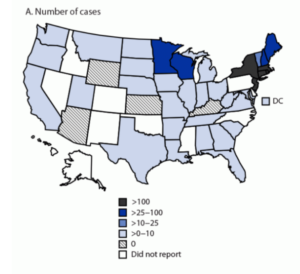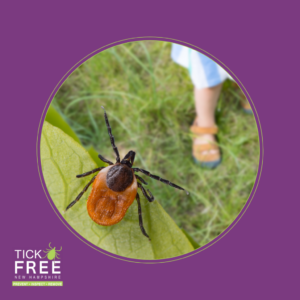Tick-borne disease in NH
 Babesiosis reaches endemic status in NH
Babesiosis reaches endemic status in NH
by Hadley Barndollar, New Hampshire Bulletin
March 21, 2023
 New Hampshire saw a more than 370 percent increase in reported cases of babesiosis, a tick-borne disease, between 2011 and 2019, according to a new federal study released last week.
New Hampshire saw a more than 370 percent increase in reported cases of babesiosis, a tick-borne disease, between 2011 and 2019, according to a new federal study released last week.
Research from the Centers for Disease Control and Prevention shows the occurrence of babesiosis increased significantly during that time in the Northeast. Specifically, New Hampshire, Maine, and Vermont should now be considered to have “endemic transmission,” meaning a disease is regularly occurring within an area, the study concluded.
But public health officials in New Hampshire say they’ve already been treating the disease as endemic for “quite some time now.”
Babesiosis is typically caused in humans by black-legged or deer ticks infected with Babesia, a type of parasite. It’s much rarer than the commonly known Lyme disease, and can cause flu-like symptoms and the destruction of red blood cells. Some people who become infected, the CDC notes, feel fine and show no symptoms.
But babesiosis can be a severe, life-threatening disease for certain populations, such as people who don’t have a spleen, those with a weak immune system and other serious health conditions, or elderly people.
 Ryan Tannian, chief of the Department of Health and Human Services Bureau of Infectious Disease Control, said between 2011 and 2022, local officials have been tracking anywhere from 13 to 80 cases per year. Long-term outcome data, he said, is still an ongoing field of research.
Ryan Tannian, chief of the Department of Health and Human Services Bureau of Infectious Disease Control, said between 2011 and 2022, local officials have been tracking anywhere from 13 to 80 cases per year. Long-term outcome data, he said, is still an ongoing field of research.
Scientists are establishing stronger links between increasing tick activity and warming temperatures, more rainfall, and less snow cover – three ingredients that form a perfect recipe for ticks and other pests to thrive.
“If it’s above freezing and there’s no snow on the ground, then the ticks are out,” Tannian said.
Because of the changing environment, the Northeast is becoming more hospitable to certain species. That includes the Lone Star tick and Asian longhorned tick, two species that have historically made their homes down south but are now expanding their reach by creeping north. Scientists and public health officials are worried about what that means for the future of tick-borne diseases.
According to the CDC study, reported cases of babesiosis increased in New Hampshire from 13 in 2011 to 63 in 2019, representing a 372 percent rate increase and about 37 cases per year. Vermont and Maine both saw increases of more than 1,000 percent.
As a result, states should ramp up tick prevention messaging, provider education, and awareness of infection risk among travelers, the study suggests.
Prevention remains the same no matter the tick-borne disease, said Tannian, and anyone showing symptoms should consult a health care professional, because ticks can carry and transmit more than one disease at a time. Additional resources can be found at tickfreenh.org.
New Hampshire Bulletin is part of States Newsroom, a network of news bureaus supported by grants and a coalition of donors as a 501c(3) public charity. New Hampshire Bulletin maintains editorial independence. Contact Editor Dana Wormald for questions: info@newhampshirebulletin.com. Follow New Hampshire Bulletin on Facebook and Twitter.
New Hampshire Bulletin stories may be republished online or in print under Creative Commons license CC BY-NC-ND 4.0. We ask that you edit only for style or to shorten, provide proper attribution and link to our web site. Please see our republishing guidelines for use of photos and graphics.